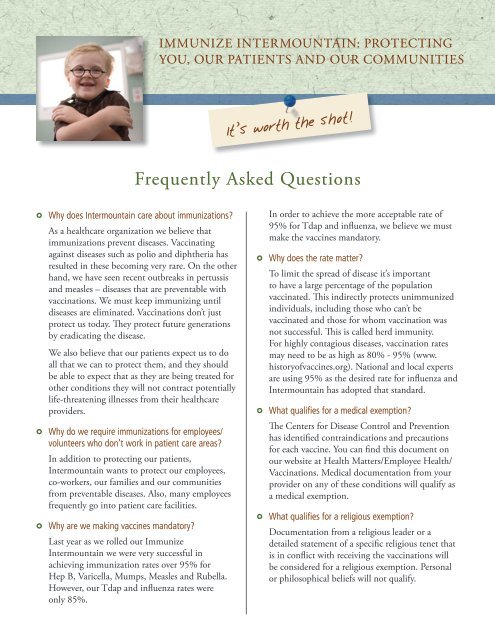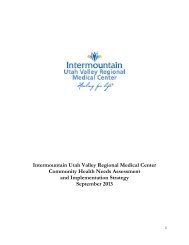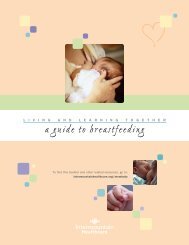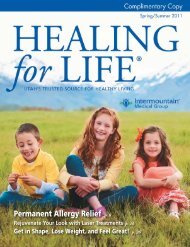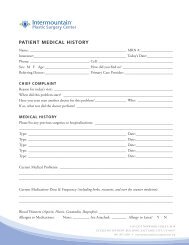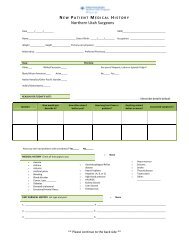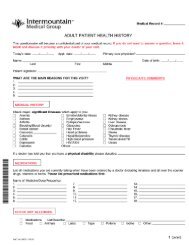Download the Frequently Asked Questions - Intermountain Healthcare
Download the Frequently Asked Questions - Intermountain Healthcare
Download the Frequently Asked Questions - Intermountain Healthcare
- No tags were found...
You also want an ePaper? Increase the reach of your titles
YUMPU automatically turns print PDFs into web optimized ePapers that Google loves.
IMMUNIZE INTERMOUNTAIN: PROTECTINGYOU, OUR PATIENTS AND OUR COMMUNITIES’It s worth <strong>the</strong> shot!<strong>Frequently</strong> <strong>Asked</strong> <strong>Questions</strong>Why does <strong>Intermountain</strong> care about immunizations?As a healthcare organization we believe thatimmunizations prevent diseases. Vaccinatingagainst diseases such as polio and diph<strong>the</strong>ria hasresulted in <strong>the</strong>se becoming very rare. On <strong>the</strong> o<strong>the</strong>rhand, we have seen recent outbreaks in pertussisand measles – diseases that are preventable withvaccinations. We must keep immunizing untildiseases are eliminated. Vaccinations don’t justprotect us today. They protect future generationsby eradicating <strong>the</strong> disease.We also believe that our patients expect us to doall that we can to protect <strong>the</strong>m, and <strong>the</strong>y shouldbe able to expect that as <strong>the</strong>y are being treated foro<strong>the</strong>r conditions <strong>the</strong>y will not contract potentiallylife-threatening illnesses from <strong>the</strong>ir healthcareproviders.Why do we require immunizations for employees/volunteers who don’t work in patient care areas?In addition to protecting our patients,<strong>Intermountain</strong> wants to protect our employees,co-workers, our families and our communitiesfrom preventable diseases. Also, many employeesfrequently go into patient care facilities.Why are we making vaccines mandatory?Last year as we rolled out Immunize<strong>Intermountain</strong> we were very successful inachieving immunization rates over 95% forHep B, Varicella, Mumps, Measles and Rubella.However, our Tdap and influenza rates wereonly 85%.In order to achieve <strong>the</strong> more acceptable rate of95% for Tdap and influenza, we believe we mustmake <strong>the</strong> vaccines mandatory.Why does <strong>the</strong> rate matter?To limit <strong>the</strong> spread of disease it’s importantto have a large percentage of <strong>the</strong> populationvaccinated. This indirectly protects unimmunizedindividuals, including those who can’t bevaccinated and those for whom vaccination wasnot successful. This is called herd immunity.For highly contagious diseases, vaccination ratesmay need to be as high as 80% - 95% (www.historyofvaccines.org). National and local expertsare using 95% as <strong>the</strong> desired rate for influenza and<strong>Intermountain</strong> has adopted that standard.What qualifies for a medical exemption?The Centers for Disease Control and Preventionhas identified contraindications and precautionsfor each vaccine. You can find this document onour website at Health Matters/Employee Health/Vaccinations. Medical documentation from yourprovider on any of <strong>the</strong>se conditions will qualify asa medical exemption.What qualifies for a religious exemption?Documentation from a religious leader or adetailed statement of a specific religious tenet thatis in conflict with receiving <strong>the</strong> vaccinations willbe considered for a religious exemption. Personalor philosophical beliefs will not qualify.
Who pays for <strong>the</strong> immunizations?All employees and volunteers can receive requiredimmunizations free of charge from <strong>the</strong> <strong>Intermountain</strong>Employee Health representative in <strong>the</strong>ir facility.Where can I learn moreabout immunizations?Your Employee Healthnurse can provide you withinformation and personalconsultation. Additionally,here are three goldstandard websites:www.immunize.orgwww.cdc.gov/vaccineswww.chop.edu/service/vaccine-educationcenter/home.htmlWhy masking?Masking during flu season is an accommodation that<strong>Intermountain</strong> is making for employees/volunteers thatreceive an exemption. This accommodation protects ourpatients while allowing for legal exceptions to our policy.Why now?Numerous national professional societies such as <strong>the</strong>Society for <strong>Healthcare</strong> Epidemiology of America (SHEA),<strong>the</strong> Infectious Diseases Society of America (IDSA) and<strong>the</strong> Association for Professionals in Infection Control andEpidemiology (ACIP) all agree that influenza vaccinations ofhealthcare workers is essential for patient safety. Additionally,Joint Commission and CMS are considering streng<strong>the</strong>ning<strong>the</strong>ir recommendations for influenza vaccination practices.In April, 2011 <strong>the</strong> Utah <strong>Healthcare</strong> Associated InfectionsGovernance Committee issued a recommendation forcompulsory influenza vaccination programs for all Utahhealthcare workers.Are o<strong>the</strong>r healthcare systems doing this?Check out this website to see a listing of healthcare systemsthat are requiring influenza vaccinations at http://www.immunize.org/honor-roll.


